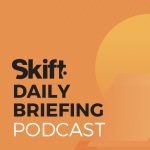Skift Take
Today's edition of Skift's daily podcast looks closer at American Air’s blended travel insights, Fiji’s new tourism campaign, and Wyndham’s optimism.

Skift Daily Briefing Podcast
Listen to the day’s top travel stories in under four minutes every weekday.
Good morning from Skift. It’s Friday, April 28. Here’s what you need to know about the business of travel today.
Listen Now
🎧 Subscribe
Apple Podcasts | Spotify | Overcast | Google Podcasts
Episode Notes
American Airlines has seen the rise in blended travel upend its business. Not only are travelers who combine work and leisure trips driving changes in its strategy, the segment is also emerging as one of the company’s most lucrative areas, reports Edward Russell, editor of Airline Weekly, a Skift publication.
American said during its first-quarter earnings call on Thursday that this mashup of blended travel represents 35 percent of the company’s bookings. Russell adds those same travelers are also behind the significant growth in its loyalty program, AAdvantage. In addition, Russell notes blended travelers’ demand for more control over their trips drove American in part to implement distributing its products to travel agencies through the so-called New Distribution Capability, a technology that gives airlines more power over their content.
American generated roughly $12 billion in revenue during the first quarter, a 37 percent year-over-year jump.
We turn next to Fiji’s new tourism campaign. The South Pacific nation is showcasing happiness as a way of life for its citizens instead of a trait reserved for tourists, reports Asia Editor Peden Doma Bhutia.
Bhutia writes Fiji leverages a happiness vibe to pay tribute to its citizens, culture and natural environment in its “Where Happiness Comes Naturally” advertising campaign. Tourism Fiji’s outgoing Chief Marketing Officer Emma Campbell said happiness lives within Fiji’s people, regardless of whether tourists are around. That tone represents a shift from a previous Fiji tourism campaign, which Butia writes was heavily criticized for perpetuating stereotypes about the country being a happy brown paradise. That marketing effort featured Australian Rebel Wilson.
Campbell said the “Where Happiness Come Naturally” campaign felt like a natural evolution to tell Fiji’s story from the perspective of its citizens. She added that resilience and a strong sense of community helped Fiji survive the pandemic.
Finally, Wyndham executives don’t see the ongoing U.S. banking crisis damaging its hotel pipeline, reports Senior Hospitality Editor Sean O’Neill.
Wyndham, the world’s largest hotel franchisor, said during an earnings call on Thursday that it wasn’t worried about March’s collapse of Silicon Valley Bank, which contributed to a tightening of lending in the U.S. Chief Financial Officer Michele Allen said the company is optimistic about its 2023 financing situation, adding the company believes there’s a significant amount of capital still available. Wyndham executives also argued many of its franchised hotels have long-standing relationships with regional banks.
Wyndham generated roughly $67 million of net income during the first quarter. The company also saw its global revenue per available room, a key industry metric, rise 11 percent compared to 2019 levels.
The Daily Newsletter
Our daily coverage of the global travel industry. Written by editors and analysts from across Skift’s brands.
Have a confidential tip for Skift? Get in touch
Tags: american airlines, blended travel, destination marketing, fiji, skift podcast, tourism marketing, wyndham